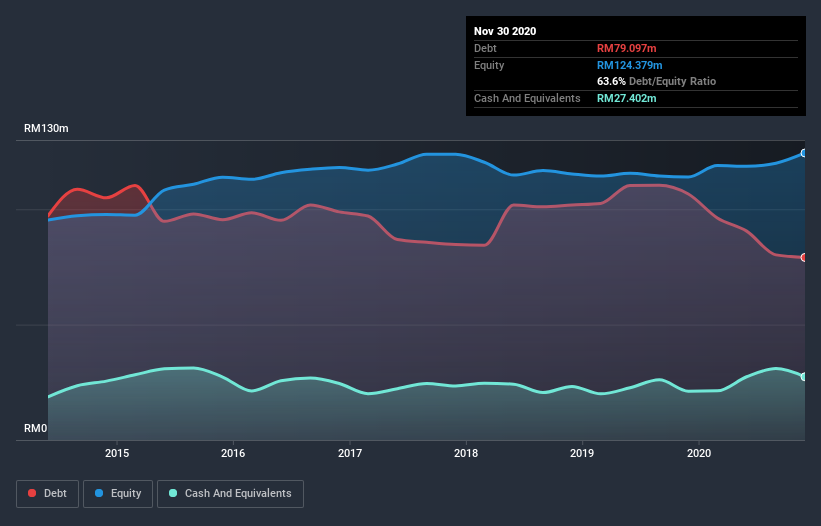- Malaysia
- /
- Consumer Durables
- /
- KLSE:PENSONI
Pensonic Holdings Berhad (KLSE:PENSONI) Has A Pretty Healthy Balance Sheet

Legendary fund manager Li Lu (who Charlie Munger backed) once said, 'The biggest investment risk is not the volatility of prices, but whether you will suffer a permanent loss of capital.' So it might be obvious that you need to consider debt, when you think about how risky any given stock is, because too much debt can sink a company. We can see that Pensonic Holdings Berhad (KLSE:PENSONI) does use debt in its business. But is this debt a concern to shareholders?
Why Does Debt Bring Risk?
Debt assists a business until the business has trouble paying it off, either with new capital or with free cash flow. In the worst case scenario, a company can go bankrupt if it cannot pay its creditors. However, a more usual (but still expensive) situation is where a company must dilute shareholders at a cheap share price simply to get debt under control. By replacing dilution, though, debt can be an extremely good tool for businesses that need capital to invest in growth at high rates of return. When we examine debt levels, we first consider both cash and debt levels, together.
See our latest analysis for Pensonic Holdings Berhad
What Is Pensonic Holdings Berhad's Debt?
You can click the graphic below for the historical numbers, but it shows that Pensonic Holdings Berhad had RM79.1m of debt in November 2020, down from RM106.6m, one year before. On the flip side, it has RM27.4m in cash leading to net debt of about RM51.7m.

A Look At Pensonic Holdings Berhad's Liabilities
According to the last reported balance sheet, Pensonic Holdings Berhad had liabilities of RM91.1m due within 12 months, and liabilities of RM37.9m due beyond 12 months. Offsetting these obligations, it had cash of RM27.4m as well as receivables valued at RM50.8m due within 12 months. So its liabilities outweigh the sum of its cash and (near-term) receivables by RM50.8m.
This deficit is considerable relative to its market capitalization of RM83.0m, so it does suggest shareholders should keep an eye on Pensonic Holdings Berhad's use of debt. Should its lenders demand that it shore up the balance sheet, shareholders would likely face severe dilution.
We measure a company's debt load relative to its earnings power by looking at its net debt divided by its earnings before interest, tax, depreciation, and amortization (EBITDA) and by calculating how easily its earnings before interest and tax (EBIT) cover its interest expense (interest cover). The advantage of this approach is that we take into account both the absolute quantum of debt (with net debt to EBITDA) and the actual interest expenses associated with that debt (with its interest cover ratio).
While Pensonic Holdings Berhad's debt to EBITDA ratio (4.1) suggests that it uses some debt, its interest cover is very weak, at 1.6, suggesting high leverage. It seems that the business incurs large depreciation and amortisation charges, so maybe its debt load is heavier than it would first appear, since EBITDA is arguably a generous measure of earnings. It seems clear that the cost of borrowing money is negatively impacting returns for shareholders, of late. The silver lining is that Pensonic Holdings Berhad grew its EBIT by 141% last year, which nourishing like the idealism of youth. If that earnings trend continues it will make its debt load much more manageable in the future. The balance sheet is clearly the area to focus on when you are analysing debt. But it is Pensonic Holdings Berhad's earnings that will influence how the balance sheet holds up in the future. So if you're keen to discover more about its earnings, it might be worth checking out this graph of its long term earnings trend.
Finally, while the tax-man may adore accounting profits, lenders only accept cold hard cash. So it's worth checking how much of that EBIT is backed by free cash flow. During the last three years, Pensonic Holdings Berhad produced sturdy free cash flow equating to 58% of its EBIT, about what we'd expect. This cold hard cash means it can reduce its debt when it wants to.
Our View
When it comes to the balance sheet, the standout positive for Pensonic Holdings Berhad was the fact that it seems able to grow its EBIT confidently. But the other factors we noted above weren't so encouraging. To be specific, it seems about as good at covering its interest expense with its EBIT as wet socks are at keeping your feet warm. Looking at all this data makes us feel a little cautious about Pensonic Holdings Berhad's debt levels. While we appreciate debt can enhance returns on equity, we'd suggest that shareholders keep close watch on its debt levels, lest they increase. When analysing debt levels, the balance sheet is the obvious place to start. However, not all investment risk resides within the balance sheet - far from it. For example Pensonic Holdings Berhad has 5 warning signs (and 2 which are significant) we think you should know about.
If, after all that, you're more interested in a fast growing company with a rock-solid balance sheet, then check out our list of net cash growth stocks without delay.
When trading Pensonic Holdings Berhad or any other investment, use the platform considered by many to be the Professional's Gateway to the Worlds Market, Interactive Brokers. You get the lowest-cost* trading on stocks, options, futures, forex, bonds and funds worldwide from a single integrated account. Promoted
If you're looking to trade Pensonic Holdings Berhad, open an account with the lowest-cost platform trusted by professionals, Interactive Brokers.
With clients in over 200 countries and territories, and access to 160 markets, IBKR lets you trade stocks, options, futures, forex, bonds and funds from a single integrated account.
Enjoy no hidden fees, no account minimums, and FX conversion rates as low as 0.03%, far better than what most brokers offer.
Sponsored ContentNew: Manage All Your Stock Portfolios in One Place
We've created the ultimate portfolio companion for stock investors, and it's free.
• Connect an unlimited number of Portfolios and see your total in one currency
• Be alerted to new Warning Signs or Risks via email or mobile
• Track the Fair Value of your stocks
This article by Simply Wall St is general in nature. It does not constitute a recommendation to buy or sell any stock, and does not take account of your objectives, or your financial situation. We aim to bring you long-term focused analysis driven by fundamental data. Note that our analysis may not factor in the latest price-sensitive company announcements or qualitative material. Simply Wall St has no position in any stocks mentioned.
*Interactive Brokers Rated Lowest Cost Broker by StockBrokers.com Annual Online Review 2020
Have feedback on this article? Concerned about the content? Get in touch with us directly. Alternatively, email editorial-team (at) simplywallst.com.
About KLSE:PENSONI
Pensonic Holdings Berhad
An investment holding company, manufactures, assembles, and sells electrical and electronic appliances in Malaysia, other Asian countries, the Middle East, and internationally.
Slight with mediocre balance sheet.
Market Insights
Community Narratives




